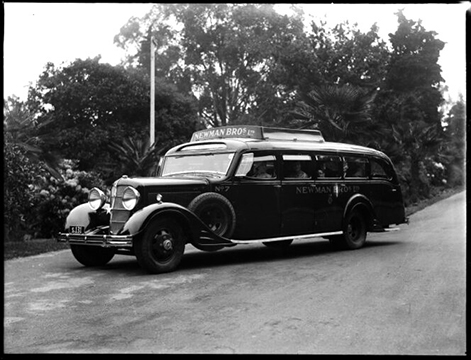Up until the 1950s people seldom left town. Only one family in three had a car and public transport was very slow, beside which everything required was available in town. Many people had been born, educated, married and then worked in the same town. Some had never ventured to Wellington.
There were rail travel services if required but these required getting to Featherston first. There was one daily Martinborough to Wellington service, Wally Marflat’s service car which went to Wellington and returned each day. Along with passengers he also carried parcels to Wellington and Featherston and back to Martinborough on the return..
These included Tip Top ice cream for a couple of shops from Tip Top’s first small Wellington factory. The ice cream was carried in heavy canvas and kapok bags known as sleeves which kept it very well.
Service cars such a Wally Marflat’s were the main providers of long distance road travel. They were stretched cars with two or three extra rear doors each opening to a bench seat. They also had a large luggage compartment behind these.
Frank and Elsie Seward ran Lake Ferry to Featherston daily service, and also ran the Pirinoa school bus driven by Elsie. Elsie was said to have the first New Zealand woman’s bus driver licence. During school holidays she sometimes took the Featherston run.
Their run was provided by a service car towing a trailer for the cans of cream which was picked up from farm gates on the way to be dropped off at the dairy factory. The empty cream cans then delivered back to the farms on the return journey.
Frank also delivered groceries, a handy service for country ladies who urgently needing an ingredient could ring the grocer to give it to Frank or Elsie.
During the whitebait season Frank also sold white baiter’s excess for them. There were frequently large runs in those days and home freezers were still a thing of the future. Prospective customers with their quart Agee jars would wait for the buses arrival
The bus arrived in Featherston at ten o’clock returning leaving again at two o’clock . Leaving plenty of time for Lower valley people to shop keep appointments etc. Frank was a stickler for leaving on time and would get very cross if a passenger he had bought in was not around on time. There were a couple of regular laties who knew he wouldn’t leave them stranded in town.



